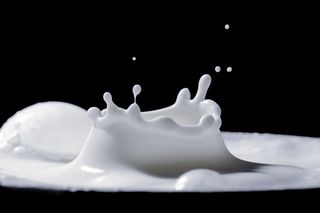Aging
Can Drinking Milk Slow Down the Aging Process?
Researchers say milk is healthful if you’re careful about which type you choose.
Posted January 20, 2020 Reviewed by Lybi Ma

The long-standing debate about the benefits and risks of drinking cow’s milk has never been settled. Some experts tout the nutritional value of milk with its high protein, calcium, and other nutrient values. At the same time, studies have also shown that milk may increase the risk of developing chronic diseases.
Meanwhile, other studies indicate no connection at all between milk consumption and disease or mortality. Recently, however, a study from Brigham Young University that looked at milk drinkers and nondrinkers found that the type of milk you drink, but not the amount, may be the most important consideration because the fat content of milk appears to have a significant effect on biological aging.
Biological aging refers to how you age at a cellular level. It is determined by the length of your telomeres, caps that seal and protect the end of each strand of the DNA in every cell of your body. (Picture a shoelace with protective plastic tips; without those plastic tips, the shoelace would unravel and no longer be protected from damage. Without telomeres, DNA is similarly damaged.) As we age, our telomeres get shorter, leading to cellular aging and death. Shortened telomeres are associated with depression, obesity, heart disease, and cancer.
The Brigham Young researchers looked at the milk consumption of a multi-racial cohort of almost 6,000 men and women. They found that adults who drink whole or reduced-fat (2 percent) milk have significantly shorter telomeres than those who drink low-fat (1 percent) or nonfat milk. Shorter telomeres are associated with premature cellular aging. In this study, those who drink low-fat or nonfat milk also had longer telomeres than those who did not drink any cow’s milk at all. In other words, it may be the milk fat, not the milk itself, that potentially causes health problems.
Other factors, such as stress, obesity, cigarette smoking, a sedentary lifestyle, and poor overall diet have also been associated with shortened telomeres. When telomeres get too short to do the job they’re designed to do, regardless of the reason, our cells age, no longer function properly, and ultimately die. The goal of this type of research is to find a way to prevent, delay, or reverse telomere shortening. While scientists are working on solutions, it may help to know that a healthy diet that includes lots of high-fiber foods, nuts and seeds, and fresh fruits and vegetables is associated with longer telomeres.
References
Tucker LA. Milk fat intake and telomere length in U.S. women and men: The role of the milk fat fraction. Oxidative Medicine and Cellular Longevity. October 28, 2019.


